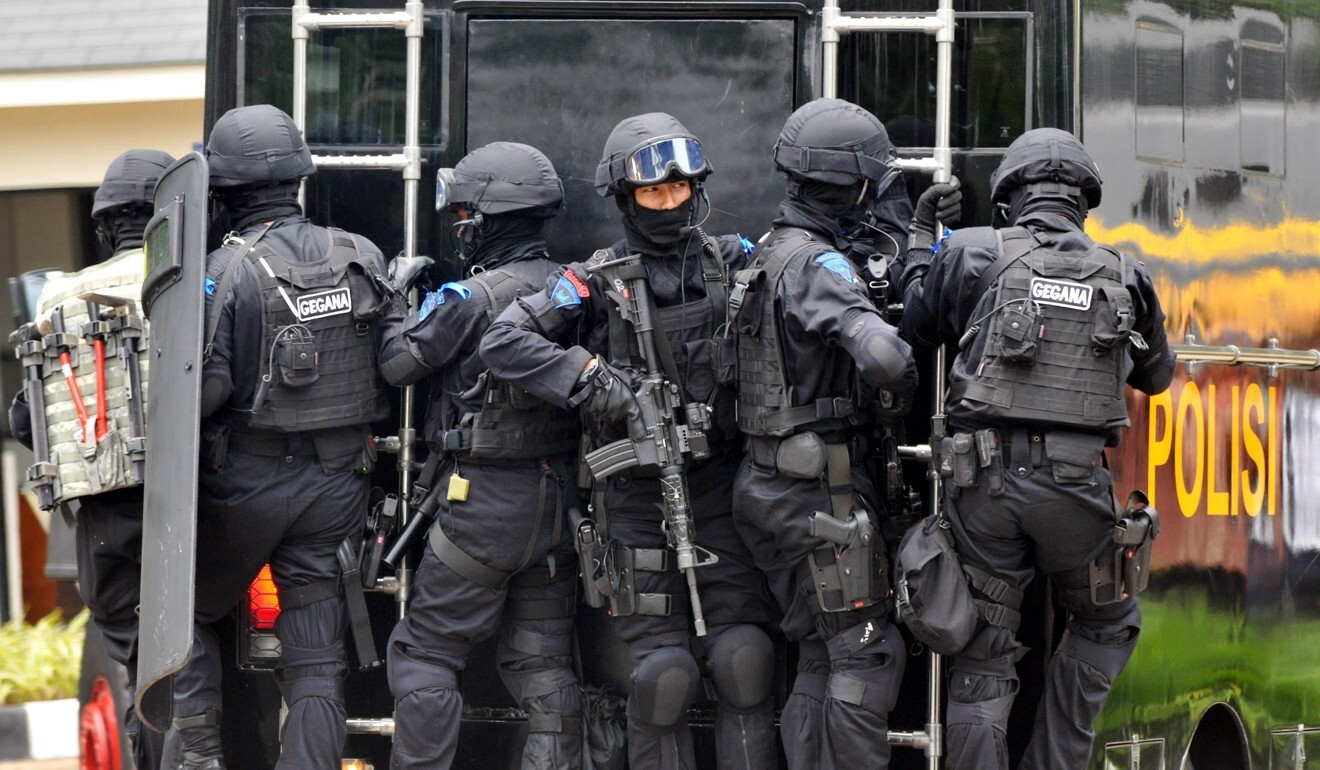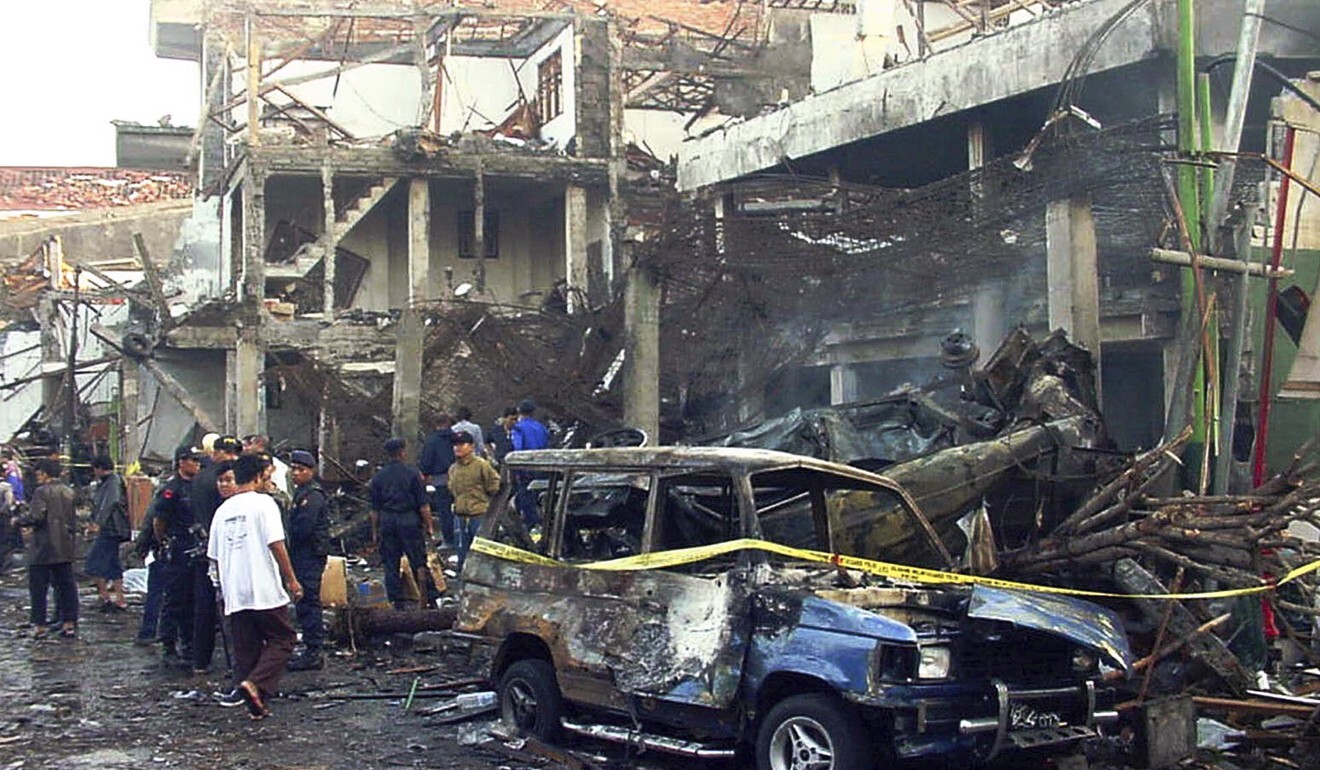
Indonesian police seize ‘Mother of Satan’ explosives from West Java mountain hideout after terrorist convict’s confession
- Imam Mulyana, a former member of an Islamic State affiliate in Indonesia, revealed that 35kg of TATP had been buried in West Java
- Police said the discovery, which came days before the 19th anniversary of the Bali bombings, showed the country’s deradicalisation efforts were working

Indonesian police have seized 35kg of the high explosive triacetone triperoxide (TATP) – also known as “The Mother of Satan” by terrorist groups – from a mountain hideout in West Java following a tip-off from a convicted militant who had been in custody for four years.
Officers from Indonesia’s elite counterterrorism squad Detachment 88 (Densus 88) said they were “astounded” by the discovery of explosives that could have been used to carry out terror attacks on a “disastrous scale”.
It also marked a major success, they said, for the country’s deradicalisation programme, which aims to change the mindset of hardened militants who view the police and government as the main obstacles to them establishing an Islamic caliphate in Indonesia, using violence if necessary.
Imam Mulyana, a former member of Indonesian Islamic State affiliate Jemaah Ansharut Daulah (JAD) who was arrested in 2017, contacted Densus 88 to reveal the location of the explosives following years of weekly deradicalisation meetings.
Aswin Siregar, head of operations at Densus 88, told This Week In Asia “Imam’s confession was a result of the successful deradicalisation programme he was undergoing to the point where it raised an awareness within him to the danger of terrorism”.

The “huge amount” of TATP seized indicated plans for attacks with a “terrible destructive force” which were pre-empted by Imam’s arrest, Aswin said, preventing a “huge disaster”.
TATP is a highly unstable explosive favoured by Isis militants, having been used in the 2005 London bombings, 2015 Paris attacks, 2016 Brussels airport bombing, and 2017’s bombing of Manchester Arena.
Hong Kong police said in July that they had seized TATP from a makeshift bomb laboratory in Tsim Sha Tsui during a raid that saw nine people, including six secondary school students, arrested on suspicion of terrorist activities.
In a video interview with Indonesian news portal Detikcom on Monday, Densus 88 commander Martinus Hukom said Imam had become very “conflicted” as the deradicalisation programme progressed, and voiced concerns about what might happen with the explosives he helped hide.
“He worried that if his friends [who were arrested at the same time as him] were freed, they would retrieve the explosives and carry out violent act,” Hukom was quoted as saying. “This created inner conflict [in him].”
After Imam confessed to the explosives’ location, Densus 88 sought permission for him to accompany a large team of officers to Mount Ciremai earlier this month to help find the cache of TATP, which was uncovered after several days of searching through thick forest “at a height of 1,450 metres above sea level in a hidden location which was very difficult to access”, Aswin said.
Just 50 grams of the TATP was enough to create a 1 metre-wide hole in the ground 20cm deep when destroyed by the police in a controlled explosion, Aswin said, with disposal of the remaining explosives causing localised tremors and landslides.
In a video recording made after the cache’s destruction, Imam said he had “cried” when he had heard of the explosive power of the TATP “because I did not realise how dangerous it was … and what could have happened if it fell into the hands of bad people who use it to carry out crimes”.
That the militant confessed to Indonesian authorities about the hidden cache is really important
“There would be even more victims or destruction that would occur,” he said, adding that he regretted his actions and thanked the police who had “to climb up a mountain and searched patiently” for the TATP.
Imam’s arrest in 2017 came after police found him acting suspiciously near an airport in West Java, three hours before President Joko Widodo’s plane was set to land. A bayonet, airsoft gun and others suspicious items were found on Imam’s person and Densus 88 said he was also found to be involved in a failed 2016 plot to bomb a car belonging to tvOne, one of the country’s largest news networks.
Benny Mamoto, head of the National Police Commission, lauded Densus 88 for deradicalising a convicted terrorist to the point where he wanted to “cooperate” and became aware that his past actions “had been wrong”.
“And finally, he wanted to show [police] where he hid the TATP. This is proof of Densus 88’s successful deradicalisation efforts,” he said.

The discovery of the explosives came days ahead of the 19th anniversary of the Bali bombings that killed 202 people, including 11 Hong Kong residents, in October 2002.
Zachary Abuza, a professor of Southeast Asia studies at the National War College in Washington, said Imam’s confession had saved “many lives”.
“That the militant confessed to Indonesian authorities about the hidden cache is really important. While many people who go through Indonesia’s disengagement programme will become recidivists, such as the couple suicide bombers in Jolo, Philippines in January 2019, some will seek ideological off-ramps,” Abuza said, adding: “This individual saved a lot of lives.”
Abuza described Densus 88 as “one of the most professional counterterrorism forces in the world, with a very strong track record of success, considering the number of militant groups, the size of their memberships and social networks, and the amount of passive public support for them”.
“Densus 88 has been working assiduously to have a nationwide presence, but they are surgical in their approach, aware that there are specific regions that are hotspots,” he added.
While the ingredients to make TATP are widely available, Abuza said “it takes some real technical skills to make it”.
“The cooking times and temperature have to be exact, and it’s highly explosive,” he said, adding that TATP had been used in the 2018 Surabaya bombings and also seized in previous raids but in smaller quantities. “So the 35kg really suggests that for a while JAD had a dedicated [TATP] manufacturing facility and was capable of producing it in significant quantities.”
Budiawan, an associate professor of chemistry at the University of Indonesia who only goes by one name, said even 1 gram of TATP was enough to cause injuries and estimated that the explosives uncovered in West Java could have been used to make as many as 16 pipe bombs.
TATP can also be used to assemble suicide vests, car bombs, suitcase bombs and rice-cooker bombs, he said.